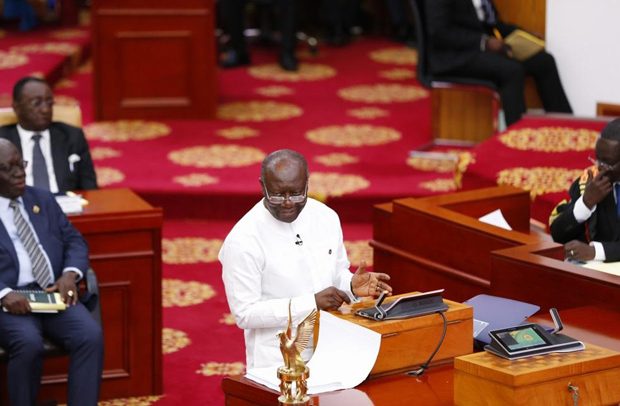Finance Minister Ken Ofori-Atta presenting the 2020 budget statement
Finance Minister Ken Ofori-Atta says cost of legacy debt and financial sector clean-up left for the government to settle amounted to GH?33 billion.
Presenting the 2020 budget statement and financial policy of government in Parliament yesterday, he stated that this was apart from the fragile structural policy and worsening macro-fiscal situation passed on to the Akufo-Addo administration.
“This government had to also address serious contractual commitments; the exorbitant energy bill from expensive, difficult-to-explain ‘take or pay’ of Power Purchase Agreements; a pile up of unpaid arrears and outstanding commitments, mostly accrued from contracts awarded without the slightest care for the public purse,” he stated.
According to him, despite the macroeconomic turbulence inherited, the economy had seen a complete turnaround with growth doubling in 32 months after the government took office.
“Our macroeconomic achievements have not gone unnoticed. Our discipline and determination to stay focused has been recognized by our global partners, namely the UN, World Bank and IMF, to mention a few,” he stated.
The Finance Minister said, “This has manifested in the selection of President Akufo-Addo as the co-Chair of the SDG Advocates, himself appointed Chairperson of the Development Committee of the World Bank, and the Governor of the Bank of Ghana appointed as the incoming Chair of the Board of Governors of the Bretton Woods Institutions.”
He indicated that in 2020, government would make a strong push on domestic revenue mobilization, business regulatory reforms, foreign direct investment, financial support to local enterprises and digitization, among other things, as priority areas to consolidate the gains achieved within the past three years.
These, he said, were intended to drive the economic transformation forward in line with the President’s Consolidated Programme and the Ghana Beyond Aid vision.
Under the domestic revenue mobilization, the Finance Minister said government would take radical policy and institutional reforms towards raising the tax-to-GDP ratio over the medium term from under 13 per cent currently to around 20 per cent.
He added that the focus would be on efficiency and base-broadening rather than imposing new taxes on the citizens and businesses, saying “this way, we can raise our domestic contribution to our ambitious transformation agenda in line with the Ghana Beyond Aid vision.”
On the drive for FDI, Mr. Ofori-Atta disclosed that the government would need higher amounts of external private capital to complement its resources in driving the transformation, and so would aggressively go after Foreign Direct Investment (FDI).
To this end, GIPC will be better resourced with human and financial capital, and government, in addition, has established an inter-ministerial committee to provide coordinated policy guidance and support to the FDI drive.
From Ernest Kofi Adu, Kumasi


